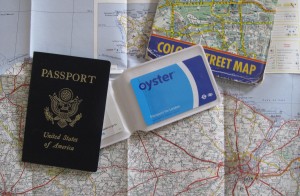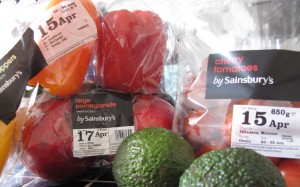 After an uneventful flight – except for the peculiar, but now familiar, experience of being folded like strange origami figurines in order to fit in coach seats for nine hours – we arrived in London right on time. It always takes a week or so to get used to new signage (as in, what a given culture feels they need to tell you and what is so “self-evident”, they simply expect you to know). So we staggered, pinball fashion, from place to place trying to find out whether the bus we needed took cash (the guess from the uniformed person we asked was ‘no’), and then finding where to recharge our Oyster cards (Could we do it at the machines and would the machines give us change? No one was sure and the machine did not include any such instructions, so probably ‘no’), then finding the bus (three different sets of directions – luckily the first one we tried was the right one). This pretty much used up the still functioning brain cells left in our jet-lagged state.
After an uneventful flight – except for the peculiar, but now familiar, experience of being folded like strange origami figurines in order to fit in coach seats for nine hours – we arrived in London right on time. It always takes a week or so to get used to new signage (as in, what a given culture feels they need to tell you and what is so “self-evident”, they simply expect you to know). So we staggered, pinball fashion, from place to place trying to find out whether the bus we needed took cash (the guess from the uniformed person we asked was ‘no’), and then finding where to recharge our Oyster cards (Could we do it at the machines and would the machines give us change? No one was sure and the machine did not include any such instructions, so probably ‘no’), then finding the bus (three different sets of directions – luckily the first one we tried was the right one). This pretty much used up the still functioning brain cells left in our jet-lagged state.
So, already in culture tilt, we simply dropped our suitcases at our home away from home and walked out to our local Sainsbury’s – a familiar store exactly where we left it when we were last in England – to rustle up enough food for supper and breakfast. I carefully brought my 1 GBP coin so that I could unhook my shopping cart (you get the coin back when you hook the cart into a cart rack – which keeps the carts right by the store in a nice neat line), but Sainsbury’s (quel domage, as the French would say) has gone to the American system…which means that carts now sit all over the parking lot because people are too lazy to return them to a cart stand. There really are some ideas that are a lot better in Europe or Africa or the Far East. Unfortunately, the rest of the world seems to adopt ours faster than we adopt theirs, usually for the worse.
Here is where culture tilt always sets in with a vengeance. Buying groceries is where we remember how big a carbon footprint transporting food leaves on the world at large. In the United States we have three huge ‘advantages’ when it comes to living in the illusion that food only costs the planet what we pay for it in the stores. The first is that the United States is a whole continent wide and most of a continent high, with multiple growing climates, so we do not need to import most foods. We do import lots of food because we want out-of-season foods year round, but we can provide everything we really need and many things we just want as luxuries without having to pay any duties or import taxes. Second, our population is so huge that we have all the benefits of scale in negotiating price per item with farmers and producers outside our borders. Third, our government (that would be us) subsidizes all the oil we use so that most of us truly believe that the fuel for our cars, trucks, trains, and planes only costs what we pay at the pump.
Wrong.
Just so you know – and I will remind you from time to time while I am here – gasoline is much closer in production price to what we will be paying here in England when we fill up the first time: 1.15 GBP per litre. Not gallon, litre. So, at the GBP to USD exchange rate at the moment that is $6.55 per gallon. Last time we were here, the rate wasn’t quite as favorable for the dollar, and we were paying $7.75 per gallon. Do you remember the screams when we passed $3.00 a gallon in the US the last time? You would have thought that life as we know it had ended.
 So things like imported avocados from Israel or raspberries (from Spain – which is at least another EU country, so no duties) or peppers from Holland (EU), or tomatoes from Morocco, cost between 150 – 300% of what they cost in the United States the week before we left. Transport costs (gasoline) account for a lot of it. The veggies we bought that are actually in season in England right now (onions, leeks, mushrooms, and a spinach-arugula mix) were still 50% higher because they aren’t grown in London, of course; they need to be transported here.
So things like imported avocados from Israel or raspberries (from Spain – which is at least another EU country, so no duties) or peppers from Holland (EU), or tomatoes from Morocco, cost between 150 – 300% of what they cost in the United States the week before we left. Transport costs (gasoline) account for a lot of it. The veggies we bought that are actually in season in England right now (onions, leeks, mushrooms, and a spinach-arugula mix) were still 50% higher because they aren’t grown in London, of course; they need to be transported here.
And just so you understand the benefits of scale and subsidized oil, I am paying more for the Red Leicester cheese I buy here in London per lb, than I pay for the same cheese, by the same cheesemaker – who is located here in England — when I buy it at King Soopers in Denver — where it has been transported almost half way around the world.
These are the simple, daily realities against which we will bump hourly for the next four months. Sometimes they make me grateful that I am traveling on a US passport because I am a citizen of the United States and I live within its borders. I will come ‘home’ to a much lower cost of living, to the ease of Wi-Fi in my own home – it is not a given here!), to cheap gas. But these daily realities also invite me to understand why people in other parts of the world are not as fond of Americans as we think they should be. Most of us are completely oblivious to the facts of life elsewhere. Much of what we take for granted or regard as ’needs’ are the most luxurious of luxuries (even for the middle class) in other places. (And please remember I am in western Europe, not in Syria or the Congo or the West Bank or Calcutta.)
We simply do not realize – or want to think about – how powerful is the impact of our country on the economics and climate and standard of living of the rest of the world. We do not want to think about how our political, economic, and moral choices affect employment in England or Turkey or Pakistan, how what we buy as a fad (quinoa, for instance) affects the ability of people who depend on it as a staple in their diets to afford it now that it can be sold by landowners to US markets for much more (driving the cost in Peru through the roof), how our refusal to sign the Kyoto accord sets a tone of elitism that sticks in the craw of smaller countries.
While we are still adjusting to a different time zone, we are taking it easy. We are walking into Richmond center to pick up the things we forgot last night in our stupor (like milk for my husband’s tea). We are letting ourselves tilt into the culture before it becomes second nature. We are allowing ourselves to pay attention. We are avidly reading very different news, which connects us to a world we don’t hear about very often (it is easy to forget how insular our life can be).
And the sun has just come out after a morning rain to highlight how brilliantly green England can be in the spring.
In peace,
Andrea
Text © 2015, Andrea La Sonde Anastos
Photos © 2014, 2015 Immram Chara, LLC
Thank you for sharing.
You are so welcome, Grover. Enjoy all the fresh fruit and vegetables we will be eating less abundantly for the next little while.
–Andrea